Developmental Assessment and the School-Aged Child: A Detailed Report
VerifiedAdded on 2022/08/12
|5
|1184
|76
Report
AI Summary
This report provides a comprehensive discussion on developmental assessments for school-aged children, emphasizing the varied needs of this age group. It explores the importance of adapting assessment techniques based on the child's age and developmental stage, considering factors such as emotional, physical, and mental abilities. The report uses a case study of a seven-year-old boy named John to illustrate the practical application of these assessment methods. Furthermore, it integrates Jean Piaget's theory of cognitive development to highlight the role of learning and knowledge acquisition in assessing a child's developmental progress. The report also provides strategies for gaining cooperation during assessments, such as creating a comfortable environment and communicating effectively. This detailed analysis helps in understanding the physical and mental status of pediatric patients, underlining the need for strong patient-provider relationships.
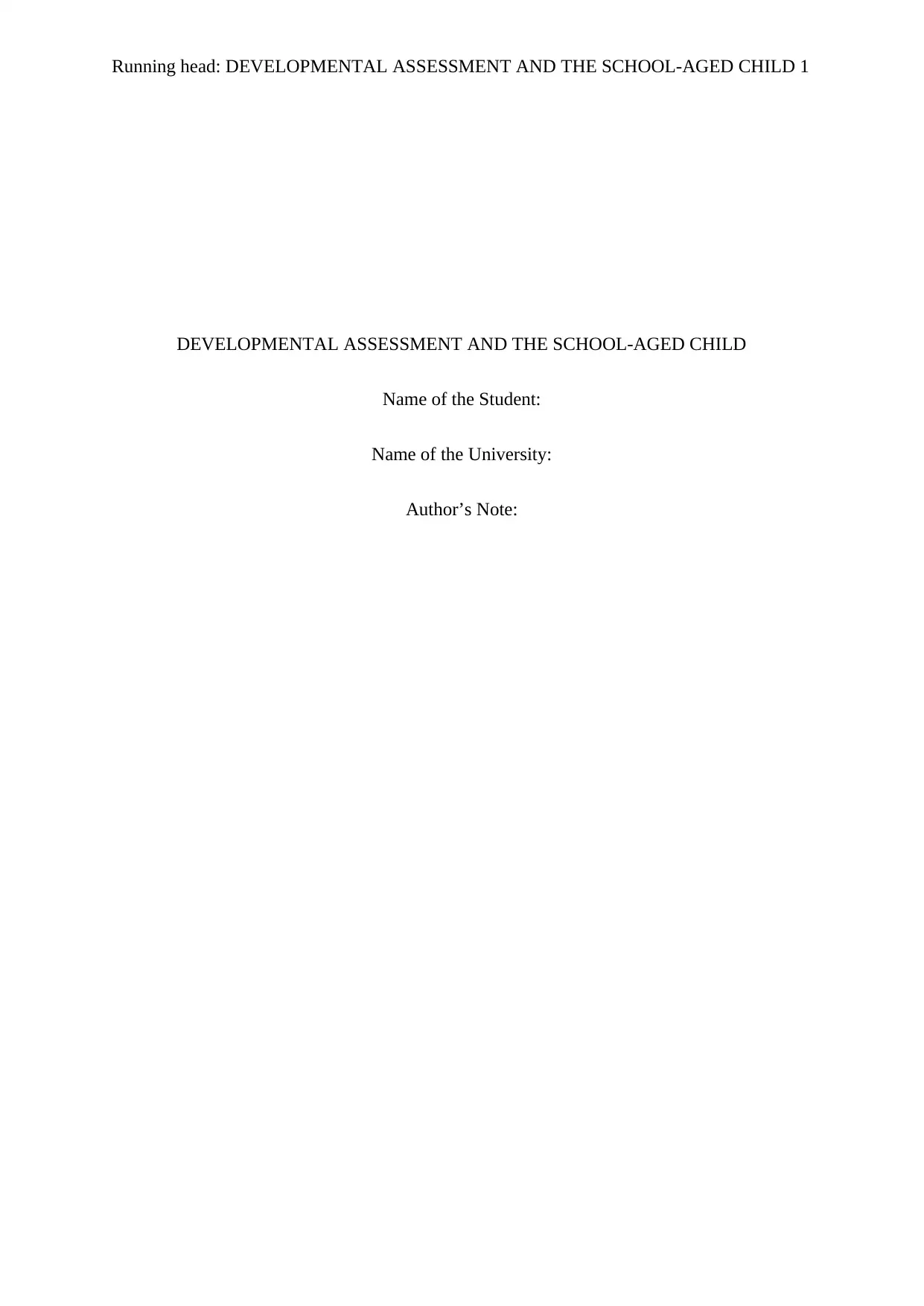
Running head: DEVELOPMENTAL ASSESSMENT AND THE SCHOOL-AGED CHILD 1
DEVELOPMENTAL ASSESSMENT AND THE SCHOOL-AGED CHILD
Name of the Student:
Name of the University:
Author’s Note:
DEVELOPMENTAL ASSESSMENT AND THE SCHOOL-AGED CHILD
Name of the Student:
Name of the University:
Author’s Note:
Paraphrase This Document
Need a fresh take? Get an instant paraphrase of this document with our AI Paraphraser
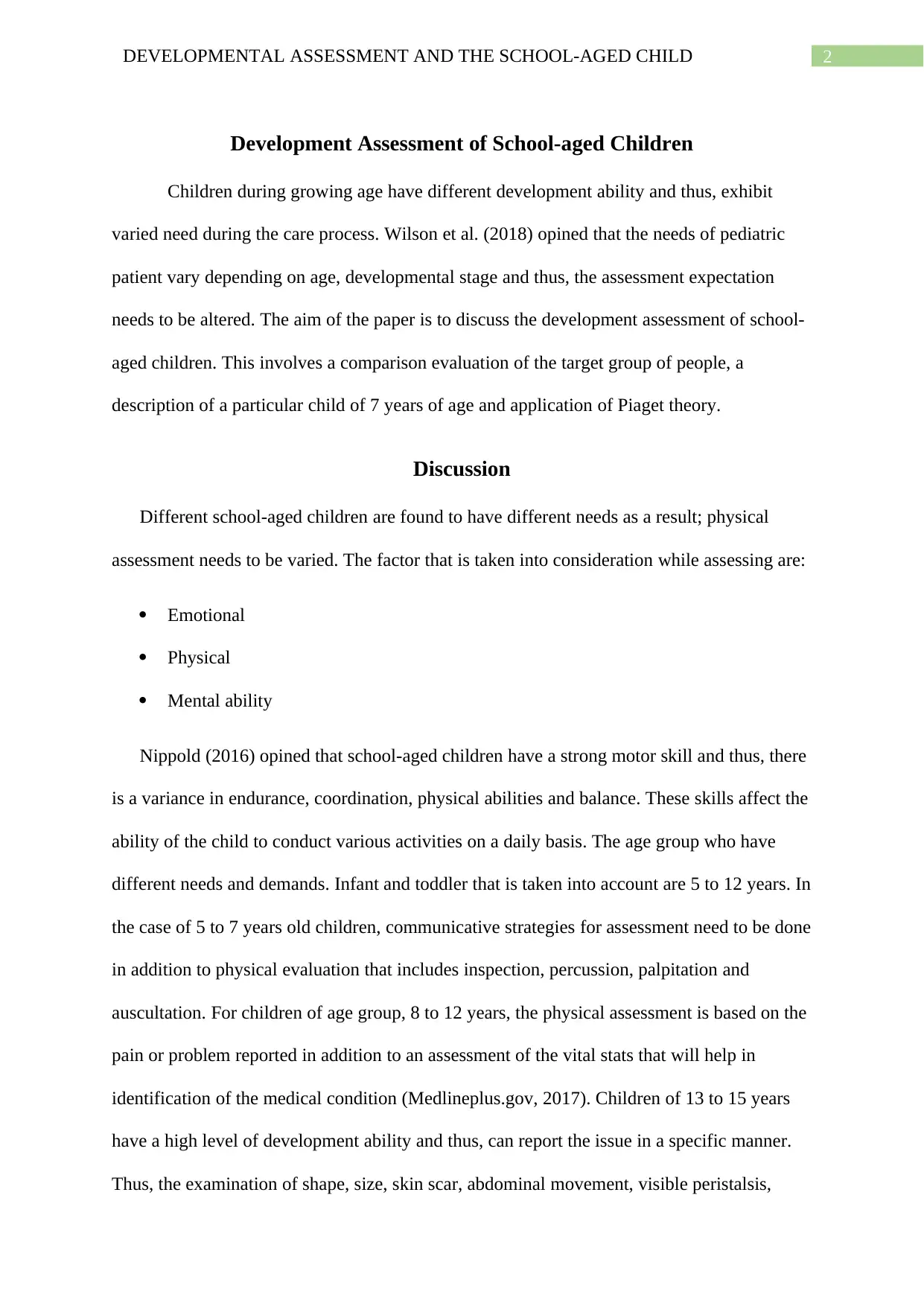
2DEVELOPMENTAL ASSESSMENT AND THE SCHOOL-AGED CHILD
Development Assessment of School-aged Children
Children during growing age have different development ability and thus, exhibit
varied need during the care process. Wilson et al. (2018) opined that the needs of pediatric
patient vary depending on age, developmental stage and thus, the assessment expectation
needs to be altered. The aim of the paper is to discuss the development assessment of school-
aged children. This involves a comparison evaluation of the target group of people, a
description of a particular child of 7 years of age and application of Piaget theory.
Discussion
Different school-aged children are found to have different needs as a result; physical
assessment needs to be varied. The factor that is taken into consideration while assessing are:
Emotional
Physical
Mental ability
Nippold (2016) opined that school-aged children have a strong motor skill and thus, there
is a variance in endurance, coordination, physical abilities and balance. These skills affect the
ability of the child to conduct various activities on a daily basis. The age group who have
different needs and demands. Infant and toddler that is taken into account are 5 to 12 years. In
the case of 5 to 7 years old children, communicative strategies for assessment need to be done
in addition to physical evaluation that includes inspection, percussion, palpitation and
auscultation. For children of age group, 8 to 12 years, the physical assessment is based on the
pain or problem reported in addition to an assessment of the vital stats that will help in
identification of the medical condition (Medlineplus.gov, 2017). Children of 13 to 15 years
have a high level of development ability and thus, can report the issue in a specific manner.
Thus, the examination of shape, size, skin scar, abdominal movement, visible peristalsis,
Development Assessment of School-aged Children
Children during growing age have different development ability and thus, exhibit
varied need during the care process. Wilson et al. (2018) opined that the needs of pediatric
patient vary depending on age, developmental stage and thus, the assessment expectation
needs to be altered. The aim of the paper is to discuss the development assessment of school-
aged children. This involves a comparison evaluation of the target group of people, a
description of a particular child of 7 years of age and application of Piaget theory.
Discussion
Different school-aged children are found to have different needs as a result; physical
assessment needs to be varied. The factor that is taken into consideration while assessing are:
Emotional
Physical
Mental ability
Nippold (2016) opined that school-aged children have a strong motor skill and thus, there
is a variance in endurance, coordination, physical abilities and balance. These skills affect the
ability of the child to conduct various activities on a daily basis. The age group who have
different needs and demands. Infant and toddler that is taken into account are 5 to 12 years. In
the case of 5 to 7 years old children, communicative strategies for assessment need to be done
in addition to physical evaluation that includes inspection, percussion, palpitation and
auscultation. For children of age group, 8 to 12 years, the physical assessment is based on the
pain or problem reported in addition to an assessment of the vital stats that will help in
identification of the medical condition (Medlineplus.gov, 2017). Children of 13 to 15 years
have a high level of development ability and thus, can report the issue in a specific manner.
Thus, the examination of shape, size, skin scar, abdominal movement, visible peristalsis,
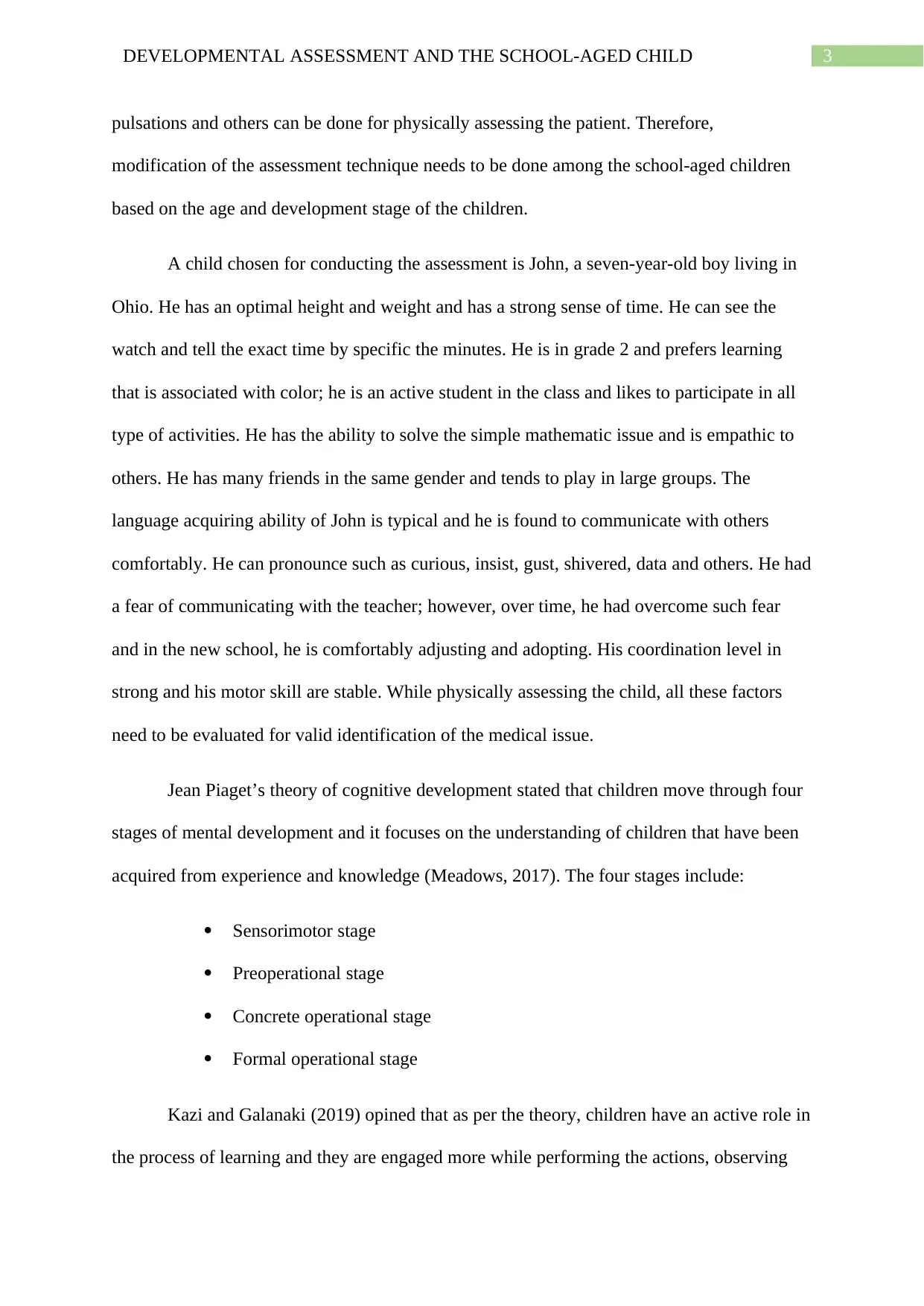
3DEVELOPMENTAL ASSESSMENT AND THE SCHOOL-AGED CHILD
pulsations and others can be done for physically assessing the patient. Therefore,
modification of the assessment technique needs to be done among the school-aged children
based on the age and development stage of the children.
A child chosen for conducting the assessment is John, a seven-year-old boy living in
Ohio. He has an optimal height and weight and has a strong sense of time. He can see the
watch and tell the exact time by specific the minutes. He is in grade 2 and prefers learning
that is associated with color; he is an active student in the class and likes to participate in all
type of activities. He has the ability to solve the simple mathematic issue and is empathic to
others. He has many friends in the same gender and tends to play in large groups. The
language acquiring ability of John is typical and he is found to communicate with others
comfortably. He can pronounce such as curious, insist, gust, shivered, data and others. He had
a fear of communicating with the teacher; however, over time, he had overcome such fear
and in the new school, he is comfortably adjusting and adopting. His coordination level in
strong and his motor skill are stable. While physically assessing the child, all these factors
need to be evaluated for valid identification of the medical issue.
Jean Piaget’s theory of cognitive development stated that children move through four
stages of mental development and it focuses on the understanding of children that have been
acquired from experience and knowledge (Meadows, 2017). The four stages include:
Sensorimotor stage
Preoperational stage
Concrete operational stage
Formal operational stage
Kazi and Galanaki (2019) opined that as per the theory, children have an active role in
the process of learning and they are engaged more while performing the actions, observing
pulsations and others can be done for physically assessing the patient. Therefore,
modification of the assessment technique needs to be done among the school-aged children
based on the age and development stage of the children.
A child chosen for conducting the assessment is John, a seven-year-old boy living in
Ohio. He has an optimal height and weight and has a strong sense of time. He can see the
watch and tell the exact time by specific the minutes. He is in grade 2 and prefers learning
that is associated with color; he is an active student in the class and likes to participate in all
type of activities. He has the ability to solve the simple mathematic issue and is empathic to
others. He has many friends in the same gender and tends to play in large groups. The
language acquiring ability of John is typical and he is found to communicate with others
comfortably. He can pronounce such as curious, insist, gust, shivered, data and others. He had
a fear of communicating with the teacher; however, over time, he had overcome such fear
and in the new school, he is comfortably adjusting and adopting. His coordination level in
strong and his motor skill are stable. While physically assessing the child, all these factors
need to be evaluated for valid identification of the medical issue.
Jean Piaget’s theory of cognitive development stated that children move through four
stages of mental development and it focuses on the understanding of children that have been
acquired from experience and knowledge (Meadows, 2017). The four stages include:
Sensorimotor stage
Preoperational stage
Concrete operational stage
Formal operational stage
Kazi and Galanaki (2019) opined that as per the theory, children have an active role in
the process of learning and they are engaged more while performing the actions, observing
⊘ This is a preview!⊘
Do you want full access?
Subscribe today to unlock all pages.

Trusted by 1+ million students worldwide
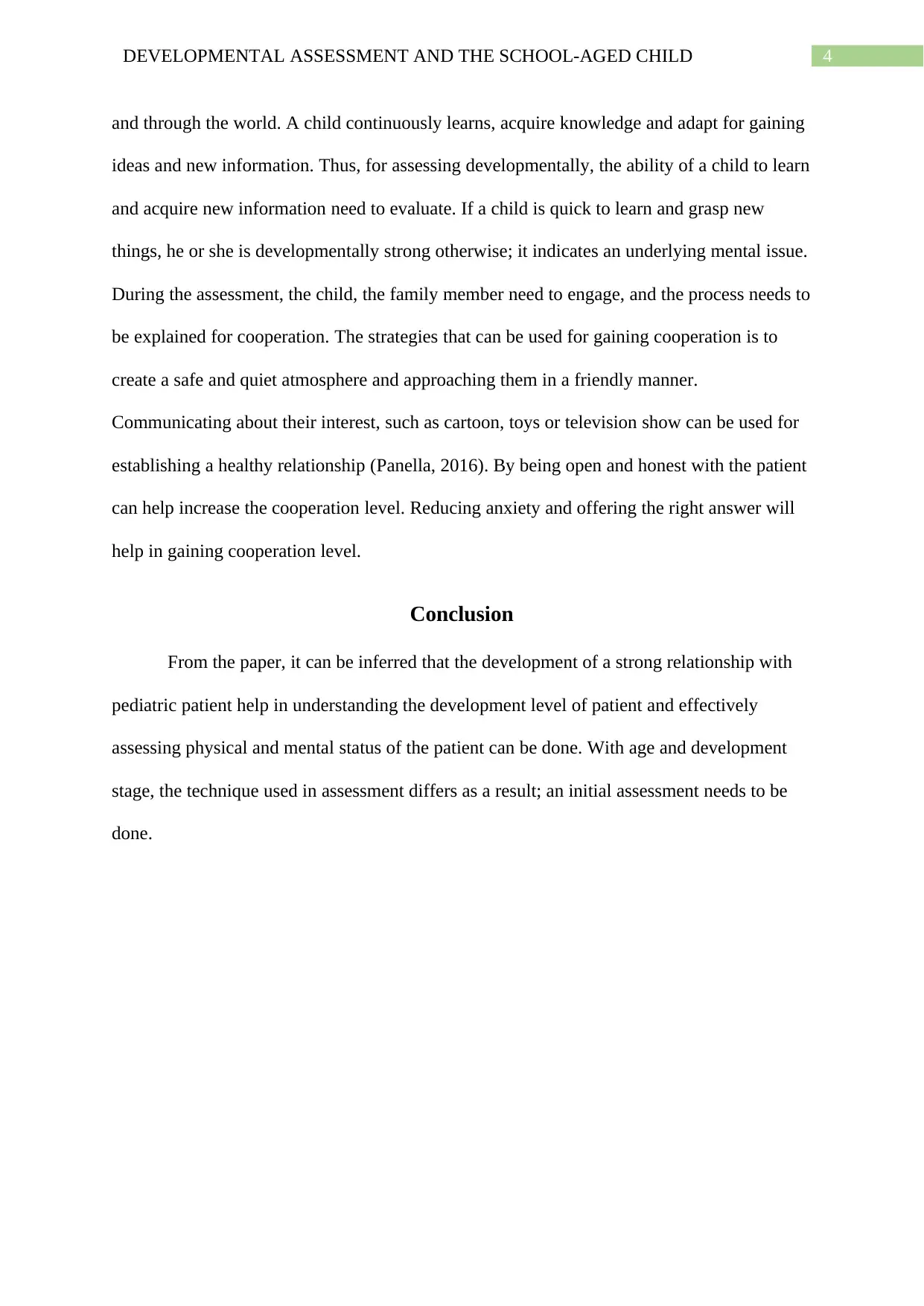
4DEVELOPMENTAL ASSESSMENT AND THE SCHOOL-AGED CHILD
and through the world. A child continuously learns, acquire knowledge and adapt for gaining
ideas and new information. Thus, for assessing developmentally, the ability of a child to learn
and acquire new information need to evaluate. If a child is quick to learn and grasp new
things, he or she is developmentally strong otherwise; it indicates an underlying mental issue.
During the assessment, the child, the family member need to engage, and the process needs to
be explained for cooperation. The strategies that can be used for gaining cooperation is to
create a safe and quiet atmosphere and approaching them in a friendly manner.
Communicating about their interest, such as cartoon, toys or television show can be used for
establishing a healthy relationship (Panella, 2016). By being open and honest with the patient
can help increase the cooperation level. Reducing anxiety and offering the right answer will
help in gaining cooperation level.
Conclusion
From the paper, it can be inferred that the development of a strong relationship with
pediatric patient help in understanding the development level of patient and effectively
assessing physical and mental status of the patient can be done. With age and development
stage, the technique used in assessment differs as a result; an initial assessment needs to be
done.
and through the world. A child continuously learns, acquire knowledge and adapt for gaining
ideas and new information. Thus, for assessing developmentally, the ability of a child to learn
and acquire new information need to evaluate. If a child is quick to learn and grasp new
things, he or she is developmentally strong otherwise; it indicates an underlying mental issue.
During the assessment, the child, the family member need to engage, and the process needs to
be explained for cooperation. The strategies that can be used for gaining cooperation is to
create a safe and quiet atmosphere and approaching them in a friendly manner.
Communicating about their interest, such as cartoon, toys or television show can be used for
establishing a healthy relationship (Panella, 2016). By being open and honest with the patient
can help increase the cooperation level. Reducing anxiety and offering the right answer will
help in gaining cooperation level.
Conclusion
From the paper, it can be inferred that the development of a strong relationship with
pediatric patient help in understanding the development level of patient and effectively
assessing physical and mental status of the patient can be done. With age and development
stage, the technique used in assessment differs as a result; an initial assessment needs to be
done.
Paraphrase This Document
Need a fresh take? Get an instant paraphrase of this document with our AI Paraphraser
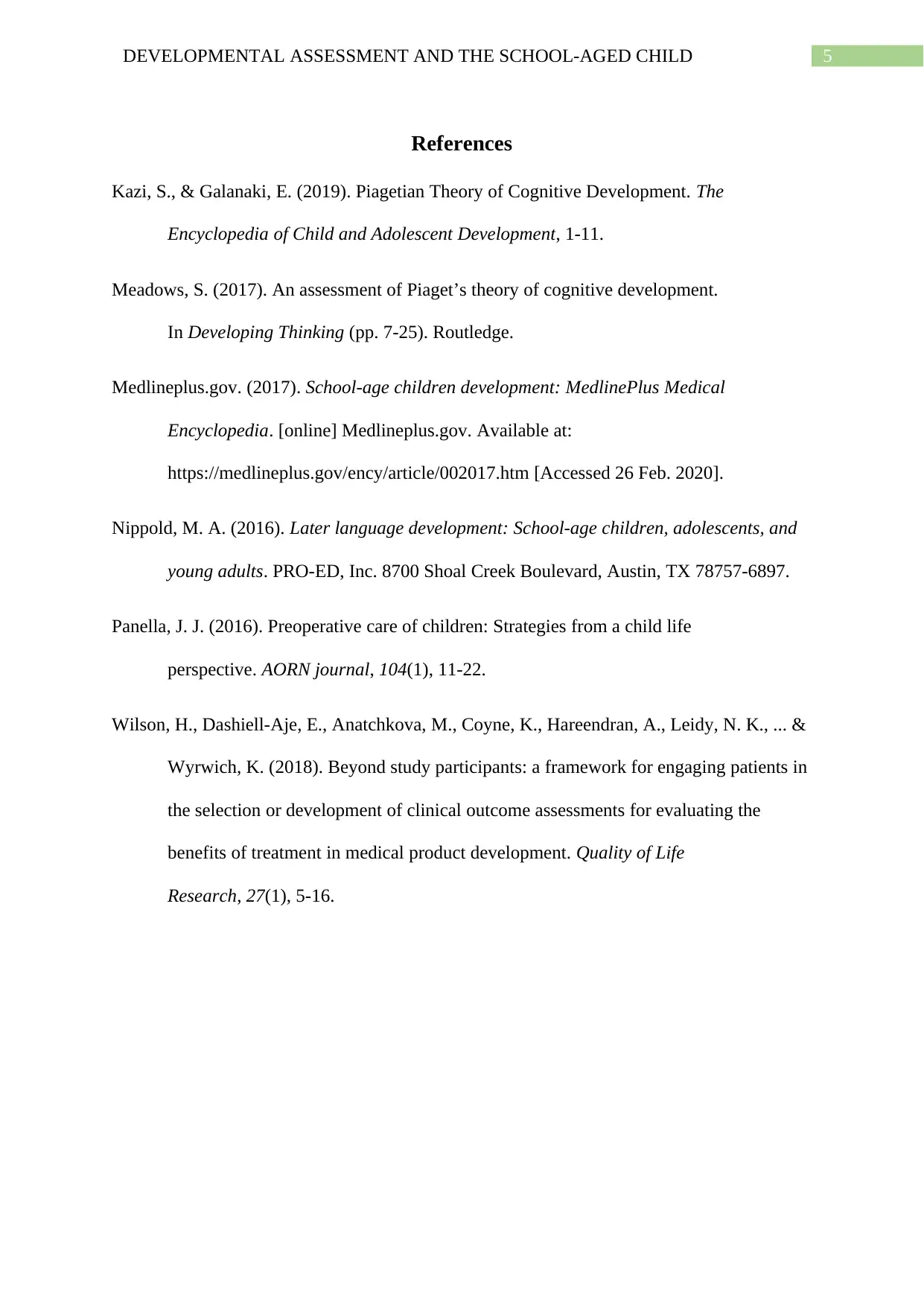
5DEVELOPMENTAL ASSESSMENT AND THE SCHOOL-AGED CHILD
References
Kazi, S., & Galanaki, E. (2019). Piagetian Theory of Cognitive Development. The
Encyclopedia of Child and Adolescent Development, 1-11.
Meadows, S. (2017). An assessment of Piaget’s theory of cognitive development.
In Developing Thinking (pp. 7-25). Routledge.
Medlineplus.gov. (2017). School-age children development: MedlinePlus Medical
Encyclopedia. [online] Medlineplus.gov. Available at:
https://medlineplus.gov/ency/article/002017.htm [Accessed 26 Feb. 2020].
Nippold, M. A. (2016). Later language development: School-age children, adolescents, and
young adults. PRO-ED, Inc. 8700 Shoal Creek Boulevard, Austin, TX 78757-6897.
Panella, J. J. (2016). Preoperative care of children: Strategies from a child life
perspective. AORN journal, 104(1), 11-22.
Wilson, H., Dashiell-Aje, E., Anatchkova, M., Coyne, K., Hareendran, A., Leidy, N. K., ... &
Wyrwich, K. (2018). Beyond study participants: a framework for engaging patients in
the selection or development of clinical outcome assessments for evaluating the
benefits of treatment in medical product development. Quality of Life
Research, 27(1), 5-16.
References
Kazi, S., & Galanaki, E. (2019). Piagetian Theory of Cognitive Development. The
Encyclopedia of Child and Adolescent Development, 1-11.
Meadows, S. (2017). An assessment of Piaget’s theory of cognitive development.
In Developing Thinking (pp. 7-25). Routledge.
Medlineplus.gov. (2017). School-age children development: MedlinePlus Medical
Encyclopedia. [online] Medlineplus.gov. Available at:
https://medlineplus.gov/ency/article/002017.htm [Accessed 26 Feb. 2020].
Nippold, M. A. (2016). Later language development: School-age children, adolescents, and
young adults. PRO-ED, Inc. 8700 Shoal Creek Boulevard, Austin, TX 78757-6897.
Panella, J. J. (2016). Preoperative care of children: Strategies from a child life
perspective. AORN journal, 104(1), 11-22.
Wilson, H., Dashiell-Aje, E., Anatchkova, M., Coyne, K., Hareendran, A., Leidy, N. K., ... &
Wyrwich, K. (2018). Beyond study participants: a framework for engaging patients in
the selection or development of clinical outcome assessments for evaluating the
benefits of treatment in medical product development. Quality of Life
Research, 27(1), 5-16.
1 out of 5
Related Documents
Your All-in-One AI-Powered Toolkit for Academic Success.
+13062052269
info@desklib.com
Available 24*7 on WhatsApp / Email
![[object Object]](/_next/static/media/star-bottom.7253800d.svg)
Unlock your academic potential
Copyright © 2020–2026 A2Z Services. All Rights Reserved. Developed and managed by ZUCOL.





